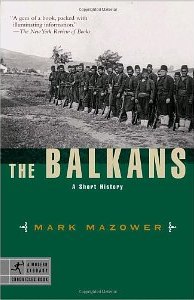The Balkans
In early modern Europe, three cities dominated the Eastern Mediterranean: Istanbul, Vienna, and Venice. Two were fading, and the third would never really become what it promised to be. The contested land that separated them became a byword for benighted backwardness and intractable conflict.
This accessible and intelligent introduction to the modern history of the Balkans runs from from the late Ottoman Empire through the aftermath of the fall of Communism. Mazower sees the long picture clearly, and is at pains to avoid romantic and sentimental myths that are at odds with the facts. This sometimes leads to odd effects, as in his treatment of the Communist era as a coda to the Second World War. He has a point: 1989 was thirty years ago and 1948 was just 41 years before that. History marches on.
What now seems especially interesting is the late Ottoman Empire and its approach to managing religions and ethnicities. It was, obviously, a failure. At the time, it seemed that Austria was making an enlightened effort and the Turk was bumbling around, but Mazower suggests this is precisely wrong — the Hapsburg’s Balkan policy can be seen as a late and futile attempt to emulate the Ottoman world without fully understanding it.

